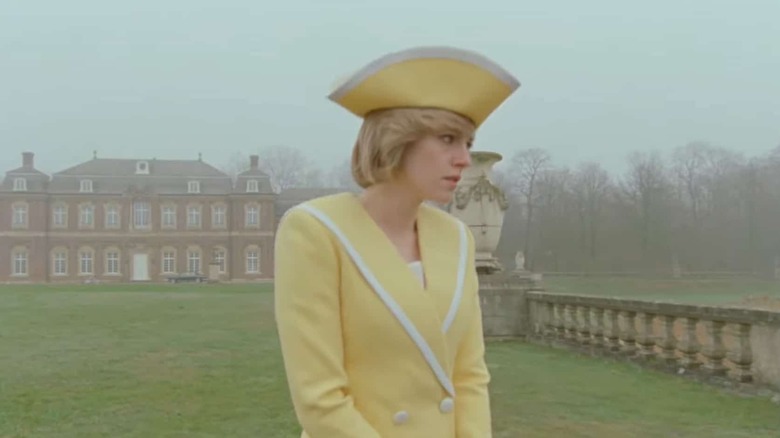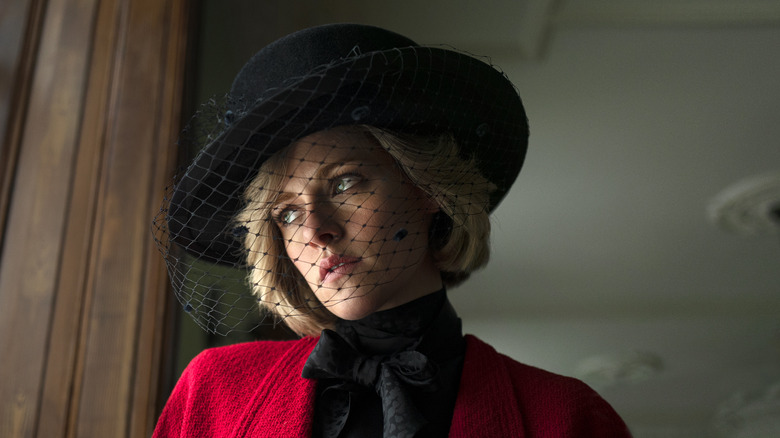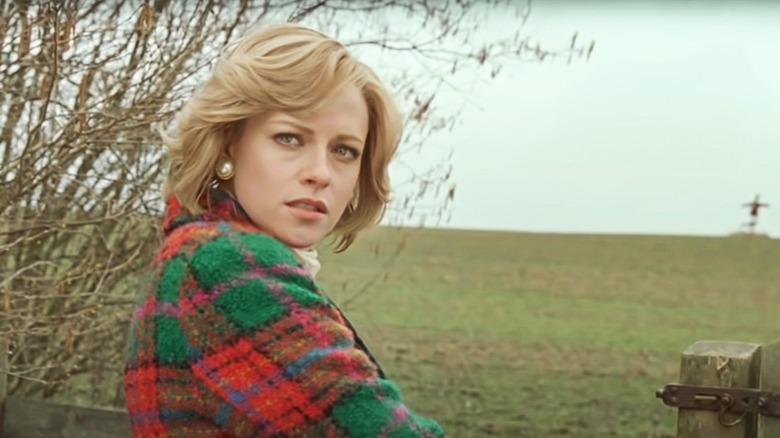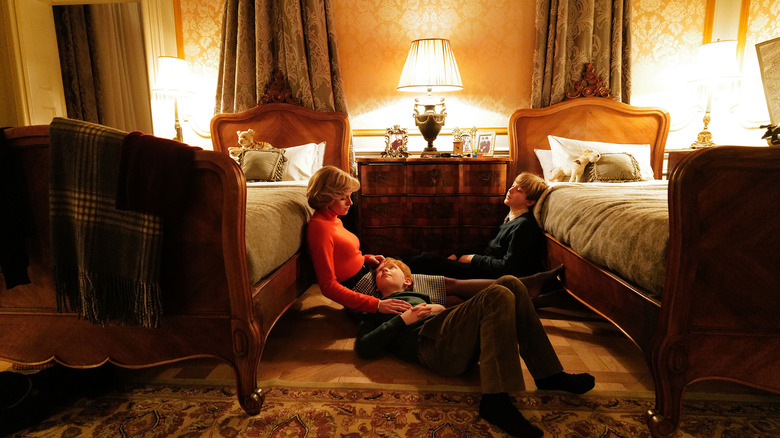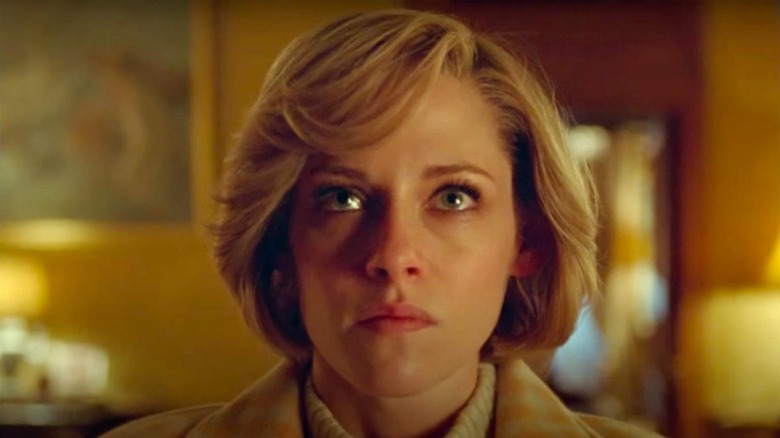Spencer Writer Steven Knight Believes Fairy Tales Are Really Horror Stories With Happy Endings [Interview]
Steven Knight is perhaps not the first writer you would think of to write a biopic about Princess Diana. But the creator of grimy crime dramas like "Peaky Blinders" and the writer behind such wildly different films as "Serenity" and "Locke" was the one on "Spencer" director Pablo Larraín's mind when he started thinking about making a film about the Princess of Wales after his acclaimed 2016 drama "Jackie."
" I think both of us knew that we shouldn't do a biopic because it's fraught with difficulty," Knight told /Film in an interview ahead of the release of "Spencer," in theaters now. "What I wanted to do was to concentrate this, to make it like a snapshot, like a paparazzi shot of Diana and hope to find the human being behind the icon in that pressure period of time."
To do so, Knight avoided looking at any materials about Diana before he sat down to pen the script. "I avoided watching any of the films or documentaries, and I didn't read any of the books," Knight said. "Because I think history finds patterns."
Knight didn't want to turn Diana into just another tragic historical figure whose fate was decided from the beginning. He was much more interested in writing a script that tries to "see the world the way she sees." As such, he settled on a horror story writ as a fairy tale.
"All fairy stories are just horror stories with a happy ending usually," Knight said.
I chatted with Knight about writing "Spencer," the Anne Boleyn of it all, and where he hopes "Spencer" will stand among the ongoing glut of Princess Diana depictions.
"It's much more of an impressionistic portrait of her."
"Spencer" is described as a fable and an imagining of what might have happened during those few fateful days that Diana spends at Sandringham House over Christmas. Did the film always start out this way as more of an interpretation than a biopic?
Yeah, I mean the genesis of it was that Pablo wanted to meet. So we met, and he said he was interested in something about Diana. And I think both of us knew that we shouldn't do a biopic because it's fraught with difficulty. And sort of, if you have that beginning, middle and end, then you can only touch lightly at every point. Whereas what I wanted to do was to concentrate this, to make it like a snapshot, like a paparazzi shot of Diana and hope to find the human being behind the icon in that pressure period of time. And I like the idea of Christmas because it's something that's possibly familiar to lots of us, to be with the family at Christmas, in a situation that may be quite tense. But this situation is multiplied hugely because of the things that are at stake and the level of the nature of the family.
So how much about Princess Diana did you immerse yourself in before sitting down to pen the script?
I avoided watching any of the films or documentaries, and I didn't read any of the books because what I didn't want is... Because I think history finds patterns. If you read the history of any life or situation, the outcome seems inevitable when you read it as a piece of history, because it's like that happened and therefore that happened. Whereas I'm much more interested in trying to experience it the way that we experience the present time, which is sort of chaotic. We don't know where this is heading and the oddness and the strangeness of everybody's real life, to try and introduce that element, so that we are not trying to paint the formal portrait of Diana really.
It's much more of an impressionistic portrait of her. And what I wanted to do was so that we, as an audience, see what she see. In other words, see the world the way she sees, because she was quite unwell at the time. And I think that gives us legitimate permission to be surreal and to see ghosts and to do all of those things. And it's basically a fairy story. And all fairy stories are just horror stories with a happy ending usually. And that's sort of what this is.
So I'm curious, was there a line between reality and fiction that you wouldn't allow yourself to cross in terms of taking creative license?
Yeah. I mean, you have to be sort of ... If you're going to be unrealistic, you've got to be realistic about it. You see? If you're going to write the fable, the fable has to be nailed up there in fact. And what I did is spoke to people who were working, and they served and observed in the house at the time. And so what I did is took firsthand accounts of events and used those as the stepping stones that we could then dance our way through and write the fable.
"This isn't about an icon. It isn't about a hero. It's about a human being."
I wanted to know about the Anne Boleyn of it all. That element was obviously the driving thematic parallel with Diana that kicks off the spiral that she experiences throughout the film. But it's also the film's kind of greatest invention as well. What went in to bring that element into "Spencer"?
It's interesting, because before the project came along, I've been reading about Anne Boleyn quite a bit. Unusually, not with a view to do something with. I very rarely read stuff that isn't related to what I do, but I'm just so fascinated by this character who ... She really had the ambition from the very beginning to be queen and was driven and discovered that it wasn't what she was expecting it to be. And I think there's parallels with Diana and also she's opposite.
I think Diana sort of went into battle without weapons. She was sort of somehow defenseless. And I think once she was in that position realized actually what it was like and then carried on and tried to do what she could do, do something good, simple and as innocent as that, do good things. And that's what she tried to do, but it was obviously a very difficult situation and no more difficult than situations, many ordinary people experience in their lives. This isn't about an icon. It isn't about a hero. It's about a human being. Who's doing what they can and a mother.
So at first blush, "Spencer" is kind of an unusual film for you to write. Though your resume is incredibly varied, you're generally known for crime dramas or thrillers. What do you think your experience in these other genres brings to a film like "Spencer" that maybe other writers who are more well versed in period dramas would not bring?
Yeah, I try to avoid if I can. Well, it's not even a deliberate attempt to avoid. I don't actually sit down at the keyboard with a genre in my mind. Do you know what I mean?
Mm-hmm.
It's like, it's a story. And I think everybody's life is a comedy, or tragedy, or drama, a thriller all within two hours. Do you know what I mean?
Yeah.
We don't live in genres. And I try if can to write the story and then figure out or let others figure out what genre it's in. But for me, this was a horror story, a fairy tale were the things in my mind that I wanted to talk about.
"Horror stories with the happy endings."
I wanted to ask about those horror elements in "Spencer." There's that sense of dread that's communicated in Pablo Larraín's direction, but also the ghosts that appear throughout the film. Can you speak to what your reading was of that fairytale, if it's a fairy tale? But that all fairy tales, I think you said are a ghost story in some ways, is that what you said?
Horror stories with the happy endings.
That's what they are. Yeah.
There is usually something grotesque. There's usually a monster there's usually a terrible jeopardy. And I'm really interested in the durability of fairy stores, because they have been around hundreds, thousands of years and they are about something that obviously resonates with human beings. And I like the idea of the princess caught in the scary castle who eventually escapes. And that's sort of what this story is, but along the way, I think we can explore the person that she was. And hopefully, an audience will recognize something of themselves.
This film is such an international production. Pablo is Chilean, Kristen is American. And I think the production company is German. You shot in Germany as well.
Yeah.
Might be a strange question, but as the sort of major British presence on the creative team, was there an expectation for you to bring sort of the Britishness into the film?
Yes. Carry the flag, carry the union. No, I mean, I think it was ... I suppose it was important that the writer was English because Diana was part of being English for quite a long time and sort of still is in a way. I mean, the story I told to [Pablo 00:08:16] is that the reason I sort of wanted to do this was because of when her funeral happened, I was in Canada, I was working and watched it on TV very early in the morning. And the gates had opened funeral of course had emerged. And I saw British people behaving in a way that British people don't normally behave. They were sobbing and wailing and expressing outward emotion. I thought, "What is going on? This is very weird." And I found myself becoming emotionally about as well.
So since then, I've always thought, "What is this connection that she had?" When Churchill died, you could say Churchill achieved hugely more than Diana ever achieved but there wasn't that grief. So what was it? So that was part of the reason I wanted to explore who she was and what effect she had.
"Once someone has passed away, they can't make mistakes, so the myth can only get better."
So what do you think of the saturation of Princess Diana that's happening in film and TV right now? What is it about her that makes her such a fascinating figure in not only British culture, but pop culture in general?
I don't know. I think it's really interesting. Once someone has passed away, they can't make mistakes, so the myth can only get better. You know what I mean? It can't be undermined by actually her physical or mental frailties. And I think that people probably see her as representing a kind of ... She very publicly tried to conciliate, to create connections, to overcome barriers, to go through barricades, and I think that people recognize that. And maybe in these times of barriers and barricades and division, people see something in her that maybe was important. But as I say, once someone is in this cycle, then I think that the myth can only continue to grow. And I see possibly like the myth of Joan of Arc has grown beyond anything that any human being could ever have done. And that sort of, I can imagine that happen to Diana as the years go.
So where you say that "Spencer" fits amongst all of these Diana titles and adaptations and versions of her? Because we talked about how this is a fairytale, this is a fable. But is this something that's still trying to break through that myth because it's just as much a character study as a fairytale?
Yeah. It's an attempt to by not referring to any works of fiction or facts that have been done about her, by not doing that. And relying on firsthand accounts. What I'm trying to do is actually find out what she's really like, without regard to the myth. And where it stands, hope that it is a sort of insight into this person who was a real person, rather than an exploration of what she represents.
"Spencer" is now playing in theaters.
